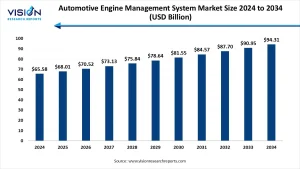The global automotive engine management System market size was reached at around USD 65.58 billion in 2024 and it is projected to hit around USD 94.31 billion by 2034, growing at a CAGR of 3.70% from 2025 to 2034.
Get a Sample@https://www.visionresearchreports.com/report/sample/41698
Automotive Engine Management System Market Overview
The global automotive engine management system market is undergoing steady transformation as advancements in automotive electronics and stringent emission norms redefine industry standards. In 2024, the market was valued at approximately USD 65.58 billion. With increasing focus on fuel efficiency, vehicle performance, and environmental compliance, the market is expected to reach USD 94.31 billion by 2034, growing at a CAGR of 3.70% from 2025 to 2034. Engine management systems, which control vital aspects like ignition, fuel injection, and emission systems, have become indispensable in modern vehicles, supporting both internal combustion engines and hybrid architectures.
Automotive Engine Management System Market Growth
Rising global concerns over greenhouse gas emissions and dwindling fossil fuel reserves have pushed governments to adopt strict emission and fuel efficiency norms. Vehicle emissions are a leading source of air pollution, causing thousands of premature deaths annually, especially in developed nations.
To comply with these regulations, automakers rely heavily on advanced Engine Management Systems (EMS). These systems optimize fuel injection and engine performance, helping reduce emissions and enhance overall fuel efficiency.
Automotive Engine Management System Market Dynamics
Drivers
- Rising automotive production globally
- Stringent emission regulations and fuel efficiency standards
- Growing demand for enhanced vehicle performance and diagnostics
Opportunities
- Technological advancements in electronic control units and software integration
- Growth in hybrid and electric vehicle adoption
- Expansion in emerging markets with rising vehicle ownership
Challenges
- High cost of advanced engine management systems
- Complex integration with existing vehicle architectures
- Increasing shift toward fully electric vehicles reducing demand for traditional engine systems
Automotive Engine Management System Market Trends
Passenger cars continue to lead the market, driven by their compact design, aesthetic appeal, and cost-effectiveness. Their growing popularity is further supported by the expanding middle-class population and improving living standards, especially across emerging economies.
The surge in demand for sports utility vehicles (SUVs) presents lucrative growth prospects for manufacturers, with SUVs now comprising over half of all passenger car sales in India. This trend is fueled by a growing preference for larger vehicles with higher ground clearance in markets like India and China.
In addition, the rapid adoption of electric vehicles (EVs) is boosting market growth, aided by favorable government incentives and expanding charging infrastructure. Notably, EV sales in India during Q1 2023 more than doubled compared to the same period in 2022.
Read More:https://www.heathcareinsights.com/package-boilers-market/
Top Companies in Automotive Engine Management System Market
- Bosch (Robert Bosch GmbH)
- Denso Corporation
- Continental AG
- Delphi Technologies (now part of BorgWarner)
- Magneti Marelli (now part of Calsonic Kansei Corporation)
- Hitachi Automotive Systems
- ZF Friedrichshafen AG
- Hyundai Mobis
- Keihin Corporation
- Visteon Corporation
Automotive Engine Management System Market Segments
- By Component: Engine Control Unit (ECU), Sensors, Fuel Injectors, Others
- By Vehicle Type: Passenger Cars, Commercial Vehicles, Off-Highway Vehicles
- By Fuel Type: Gasoline, Diesel, Hybrid, Others
- By Sales Channel: OEM, Aftermarket
Future Outlook
The automotive engine management system market is poised for moderate yet consistent growth over the next decade. While traditional combustion engine technologies will continue to dominate in many regions, hybrid systems will account for a growing share due to regulatory and consumer pressures. Investment in lightweight materials, digital interfaces, and predictive maintenance technologies will further enhance the role of engine management systems in the evolving mobility ecosystem.
Buy this Premium Research Report@https://www.visionresearchreports.com/report/checkout/41698
You can place an order or ask any questions, please feel free to contact
sales@visionresearchreports.com| +1 650-460-3308
